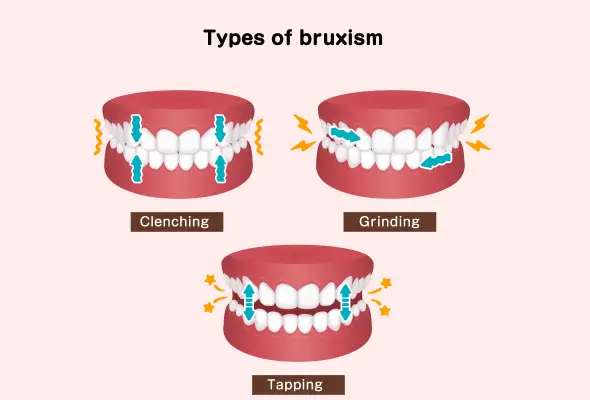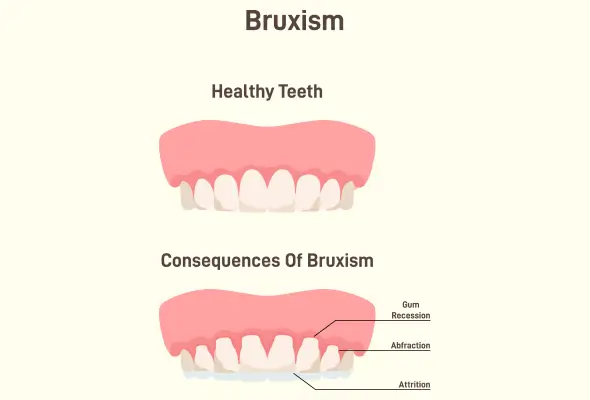-
Doctors
-
Specialities & Treatments
Centre of Excellence
Specialties
Treatments and Procedures
Hospitals & Directions HyderabadCARE Hospitals, Banjara Hills CARE Outpatient Centre, Banjara Hills CARE Hospitals, HITEC City CARE Hospitals, Nampally Gurunanak CARE Hospitals, Musheerabad CARE Hospitals Outpatient Centre, HITEC City CARE Hospitals, Malakpet
HyderabadCARE Hospitals, Banjara Hills CARE Outpatient Centre, Banjara Hills CARE Hospitals, HITEC City CARE Hospitals, Nampally Gurunanak CARE Hospitals, Musheerabad CARE Hospitals Outpatient Centre, HITEC City CARE Hospitals, Malakpet Raipur
Raipur
 Bhubaneswar
Bhubaneswar Visakhapatnam
Visakhapatnam
 Nagpur
Nagpur
 Indore
Indore
 Chh. Sambhajinagar
Chh. SambhajinagarClinics & Medical Centers
Book an AppointmentContact Us
Online Lab Reports
Book an Appointment
Consult Super-Specialist Doctors at CARE Hospitals

Bruxism
Symptom, Causes, Diagnosis and Treatment
Bruxism
Bruxism is a common dental condition attracting the interest of scientists and doctors of various fields, such as physicians, dentists, orofacial specialists, and neurologists. Many individuals are unaware they have bruxism until they experience symptoms or their dentist spots signs of wear on their teeth. This blog explores the symptoms, causes, and treatments for bruxism. It delves into the fact that why some people grind their teeth at night, possible reasons for bruxism, and various ways to treat and prevent this condition.

What is Bruxism?
Bruxism is a common orofacial condition marked by the involuntary grinding, clenching, or grating (gnashing) of teeth. This behaviour typically occurs subconsciously and can happen during both wakefulness and sleep.
- Awake bruxism (AB), which occurs during the day, involves the involuntary clenching or grinding of the teeth and jaw while a person is awake and alert.
- Sleep bruxism (SB), which takes place during the night, is more prevalent and has been studied more extensively than its daytime counterpart.
Bruxism involves rhythmic contractions of the masseter muscles, which are responsible for chewing. These contractions are often accompanied by teeth grinding and mandible thrusting. During episodes of sleep bruxism (nocturnal bruxism), individuals may exert a force of up to 250 pounds on their teeth, which can lead to significant dental damage over time. Bruxism at night usually occurs in the early stages of sleep, particularly during stages 1 and 2 of non-REM sleep.
The prevalence of bruxism varies across age groups. Sleep bruxism is most common in children and adolescents, affecting 15% to 40% of children, while 8% to 10% of adults experience it. Awake bruxism, on the other hand, affects 22.1% to 31% of the population.
Common Symptoms of Bruxism
Bruxism has a range of symptoms that can affect oral health and overall well-being. Many individuals with this condition may not be aware of their teeth-grinding habit, especially if it occurs during sleep. However, certain signs can indicate bruxism, such as:
- Involuntary Clenching and Grinding of Teeth: This behaviour typically happens in short episodes lasting up to a few seconds. The frequency of these episodes can vary, and teeth grinding may not occur every night.
- Pain: People with bruxism often experience pain in their face, neck, and shoulders.
- Jaw Discomfort: It is common and can lead to temporomandibular disorder (TMD).
- Morning Headaches: These headaches often feel like tension headaches and can last for hours or even days.
- Dental Issues: Worn-down or broken teeth, increased sensitivity, and loss of teeth and fillings are common consequences.
- Other Symptoms: These include earaches, tinnitus (ringing in the ears), and disturbed sleep.
Underlying Causes and Risk Factors of Bruxism
Bruxism doesn't have a single specific cause. Instead, it involves multiple factors, including physiological, psychological, and genetic components.
- Stress and Anxiety: Individuals with depression or generalised anxiety disorder are more likely to grind and gnash their teeth at night or clench their jaw during the day.
- Medications: Certain medicines, like selective serotonin reuptake inhibitors (SSRIs), may also trigger bruxism as a side effect.
- Medical Conditions: Bruxism can be seen with some mental health and medical disorders, such as gastroesophageal reflux disorder (GERD), Parkinson's disease, dementia, epilepsy, night terrors, and attention-deficit/hyperactivity disorder (ADHD).
- Sleep Disorders: Conditions like sleep apnea have a strong link to bruxism.
- Lifestyle Habits: Smoking, drinking alcohol, and consuming large amounts of caffeine can double the risk of teeth grinding.
- Personality Types: Individuals who are aggressive, competitive, or hyperactive may be more prone to bruxism.
- Age: Bruxism can develop at any age but is more common in young children and adolescents.
- Family History: Sleep or nocturnal bruxism tends to occur in families.

Complications
Bruxism can result in a range of complications that affect both oral health and overall wellness, including:
- Tooth Damage: Over time, the constant grinding and clenching can cause teeth to become worn, flattened, or even chipped. This wear can lead to increased tooth sensitivity, particularly to hot and cold temperatures, as the protective layer of enamel is eroded.
- Temporomandibular joint (TMJ) Disorders: People with bruxism may experience jaw stiffness and pain, difficulty opening and closing the mouth, and hearing clicking or popping sounds when moving the jaw.
- Sleep Disturbances: Many individuals with this condition report difficulty falling asleep, frequently waking from sleep, and feeling unrefreshed in the morning. This can lead to daytime sleepiness, impaired cognitive function, and reduced academic or work performance.
- Pain: The stress placed on the facial muscles due to bruxism can result in chronic headaches, earaches, and facial pain.
- Damage of Dental Prosthesis: Bruxism can damage dental work such as crowns, fillings, and implants, leading to frequent replacements and additional dental procedures.
Diagnosis
- Medical History and Oral Examination: Dentists play a crucial role in diagnosing bruxism. They may ask about symptoms like morning jaw pain, headaches, or jaw locking. They'll inquire about sleep quality, family history, and risk factors such as stress, anxiety, or medication use. During regular oral check-ups, they examine the teeth for signs of wear and tear, such as flattened tips or broken teeth. These dental abnormalities can be early indicators of bruxism.
- X-rays: Dental and maxillofacial X-rays may also assess damage to teeth and underlying bone structures.
- Sleep Study: Doctors sometimes recommend a sleep study (polysomnography). This test records brain waves, heartbeat, and breathing patterns during sleep. While not always necessary for diagnosing bruxism alone, it can help identify related sleep disorders like sleep apnea.
Treatment for Bruxism
Bruxism cure focuses on preventing further tooth damage and relieving associated symptoms. Various approaches are available, including:
- Dental Interventions: Dental approaches are often the first line of bruxism treatment.
- Dentists may recommend splints or mouth guards, which are designed to keep teeth separated and protect them from the damage caused by clenching and grinding.
- In severe cases, dental correction may be necessary, involving reshaping the chewing surfaces or using crowns to repair damage.
- Behavioural Techniques:
- Stress management techniques, like yoga, meditation, and exploring hobbies.
- Biofeedback, a method that uses monitoring equipment to teach control of muscle activity in the jaw, may benefit those struggling to change their habits.
- Medications:
- Muscle relaxants taken before bedtime for a short period may help.
- In refractory cases, drugs such as antidepressants or anti-anxiety might be used.
- Botulinum toxin injections in the masseter & temporal muscles every six months may relieve patients with severe bruxism.
When to See a Doctor
You should see a dentist if you experience persistent jaw pain, facial discomfort, or ear pain. These symptoms could be signs of bruxism or related temporomandibular joint disorders. Additionally, if your partner notices you grinding your teeth during sleep, it's time to consult a professional.
In some cases, you might be referred to a therapist or counsellor if psychological factors are suspected to play a role in your bruxism.
Prevention
Preventing bruxism involves a combination of lifestyle changes and proactive measures. These include:
- Wearing a mouth guard at nighttime
- Practising relaxation techniques before bedtime can help alleviate tension that often leads to teeth grinding.
- Regular exercise helps reduce stress levels and may help prevent bruxism.
- Maintaining good sleep hygiene is essential. Establish a consistent sleep schedule & make a relaxing bedroom environment. This might include taking a warm bath, applying a heating pad to your jaw, or drinking caffeine-free herbal tea to relax your facial muscles.
- Practise mindfulness and periodically check if you're holding tension in your jaw.
- Avoid chewing on non-food items like pen caps or ice, as these habits can reinforce jaw clenching. On days when your bruxism flares up, steer clear of chewy foods that require excessive jaw movement.
Conclusion
Bruxism is a complex dental condition that impacts many people's lives. Dealing with bruxism often needs a mix of approaches. These can include using mouthguards, managing stress, and sometimes taking medication. Taking action early can protect your teeth and improve your overall well-being.
FAQs
1. Can you naturally stop bruxism?
There are several natural ways to manage bruxism. Stress-lowering techniques like deep breathing exercises can help relax jaw muscles. Maintaining good sleep hygiene, avoiding caffeine and alcohol before bedtime, and practising jaw exercises may also be beneficial.
2. Does bruxism go away?
Bruxism at night doesn't always go away on its own, especially in adults. In children, it often resolves as they grow older. Addressing underlying causes like stress or sleep disorders can help reduce symptoms for adults. However, long-term management may be required in many cases.
3. What are the leading causes of bruxism?
The exact cause of bruxism isn't fully understood, but several factors can contribute. Stress and anxiety are the most common causes. Sleep disorders, certain medications, and lifestyle habits like smoking or excessive caffeine consumption can also play a role. Misaligned teeth or jaw problems may sometimes lead to bruxism at night.
4. Is bruxism serious?
While not life-threatening, bruxism can lead to serious dental and health issues if left unattended. It can result in significant tooth damage, jaw pain, headaches, and even temporomandibular joint disorders. The constant grinding of teeth can wear down tooth enamel, increase tooth sensitivity, and cause potential tooth structure loss.
5. What deficiency causes bruxism?
Recent studies have suggested a connection between vitamin D deficiency and bruxism. Low vitamin D levels can disrupt calcium homeostasis, affecting neuromuscular function and potentially leading to muscle spasms. Magnesium deficiency has also been linked with increased muscle tension and bruxism.
Still Have a Question?




